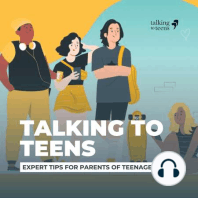22 min listen

Ep 235: The Hidden Power of High Sensitivity
Ep 235: The Hidden Power of High Sensitivity
ratings:
Length:
26 minutes
Released:
Apr 2, 2023
Format:
Podcast episode
Description
Our sponsor this week is Tallo. Check them out! Visit our website, talkingtoteens.com, to sign up for our newsletter so you'll never miss an episode!When a teen slams a door after not getting their way, or bursts into tears at a throwaway comment, parents might feel like every interaction with their teen ends in hysterics. Other times parents might worry their sensitive teen will have trouble making friends or being in groups because they are easily overwhelmed. But sensitivity, shyness, and introversion are not flaws. It can be difficult for parents to see their teen struggling with sensitivity. They may feel frustrated or helpless, not knowing how to help their child. It can also be difficult for them to relate to their child's experience if they themselves are more extroverted and don't fully understand what it's like to be shy or introverted.Children who are sensitive may be at higher risk for anxiety and depression, and may struggle with social skills throughout their lives if they don't receive proper support. It's important for parents to help their child build confidence and develop social skills, not just for their immediate well-being but for their long-term success and happiness.To understand more about this topic, we spoke with Jenn Granneman, co-author of the book Sensitive: The Hidden Power of the Highly Sensitive Person in a Loud, Fast, Too-Much World, and founder of Introvert, Dear, a website and community for introverts. Jenn is an introvert herself and has struggled with shyness and social anxiety throughout her life. She has dedicated her career to helping other introverts embrace their true selves and thrive in a world that can sometimes feel overwhelming to them.Introverted, or Just Shy?To better understand shyness and introversion, Jenn Granneman explains the difference between the two. While shyness is a fear of social judgment, introversion is a preference for solitude and reflection. Jenn notes that shyness is often seen as a negative trait, but she argues that it is simply a personality trait like any other. However, shyness can lead to negative consequences such as missing out on opportunities and feeling isolated.Introversion, on the other hand, is often misunderstood as being shy, but it is not the same thing. Introverts can be confident and social, but they simply prefer to spend time alone or in small groups. Jenn notes that society often values extroversion over introversion, which can lead to introverts feeling like they don't fit in or are not as valued.Jenn emphasizes that shyness and introversion are not things that need to be "fixed" or "cured." Rather, it's important to understand and accept these traits in ourselves and others. By doing so, we can create a more inclusive and understanding society.To help parents understand their shy or introverted children, Jenn suggests paying attention to their child's behavior and respecting their boundaries. She notes that introverted children may need more alone time to recharge, while shy children may need more encouragement and support to face their fears.Supporting a Sensitive ChildSupporting a sensitive child can be challenging, but there are ways to help them thrive. By validating your child's feelings, creating a safe environment, teaching coping strategies, and seeking outside support when needed, parents can help their sensitive children thrive and lead fulfilling lives.First, it's important to validate their feelings and let them know it's okay to be sensitive. This can help them feel accepted and understood, which can boost their confidence. Creating a safe and comfortable environment at home is also crucial. Sensory-sensitive children may need a quiet space to relax, while socially-sensitive children may benefit from smaller social settings. It's important to respect your child's boundaries and not force them to do things that make them uncomfortable. Parents can also help their sensitive children develop coping strategies, such as deep br
Released:
Apr 2, 2023
Format:
Podcast episode
Titles in the series (100)
Ep 21: Teaching Your Teen to Be Happy: Tim Bono, author of When Likes Aren't Enough, reveals some strategies parents can use to help teens cope with setbacks and maintain a positive outlook in the face of obstacles and failure. Ultimately, the tools discussed in this interview are things that by Talking To Teens: Expert Tips for Parenting Teenagers